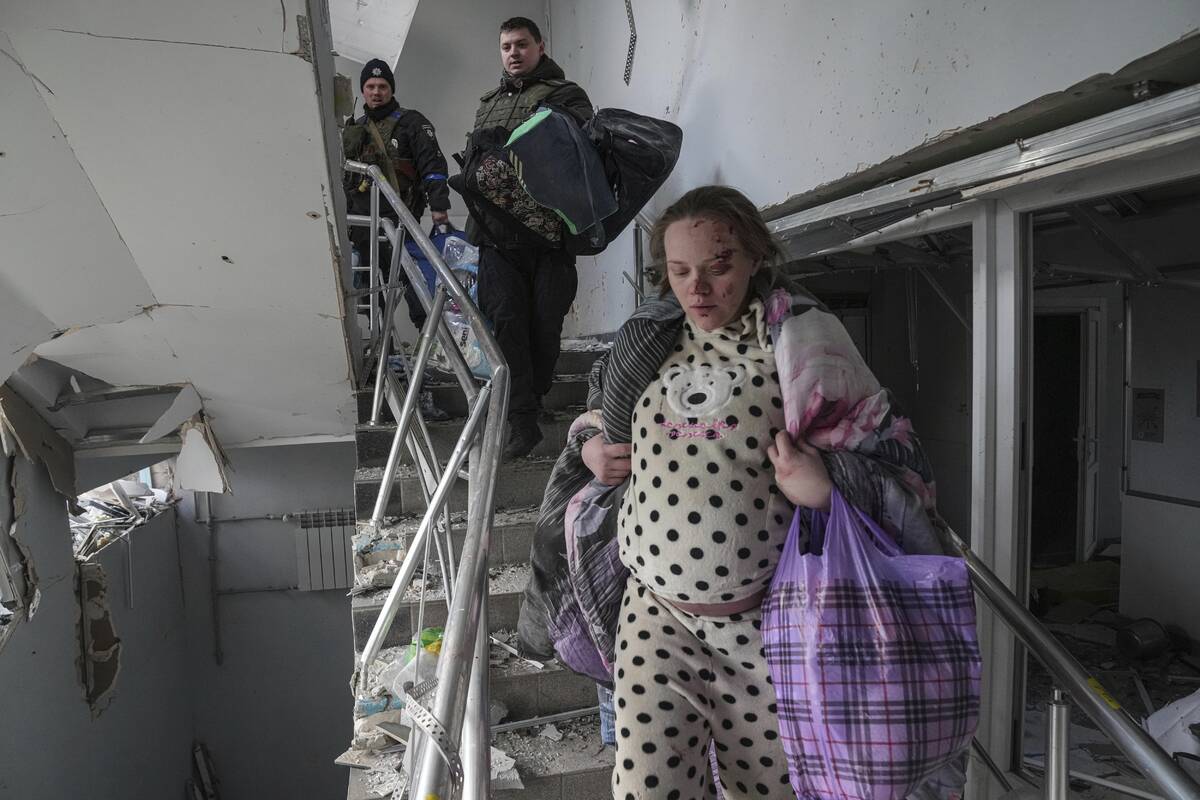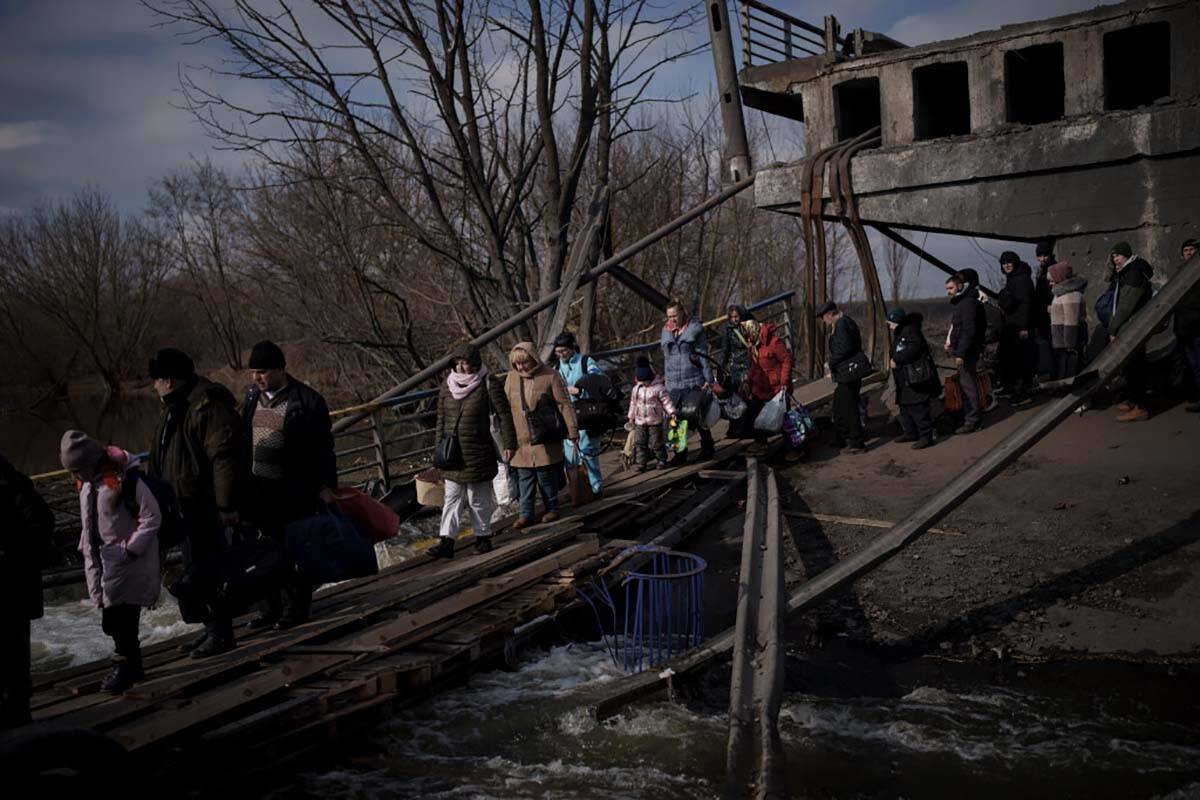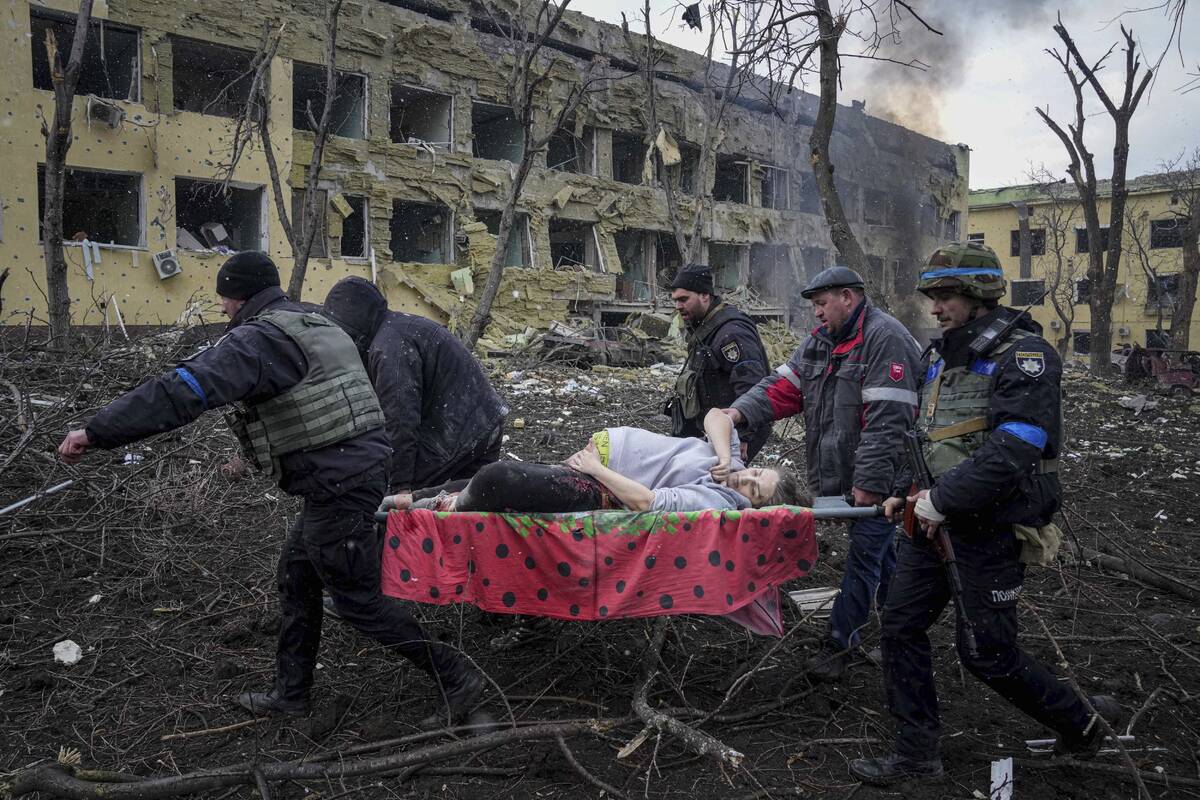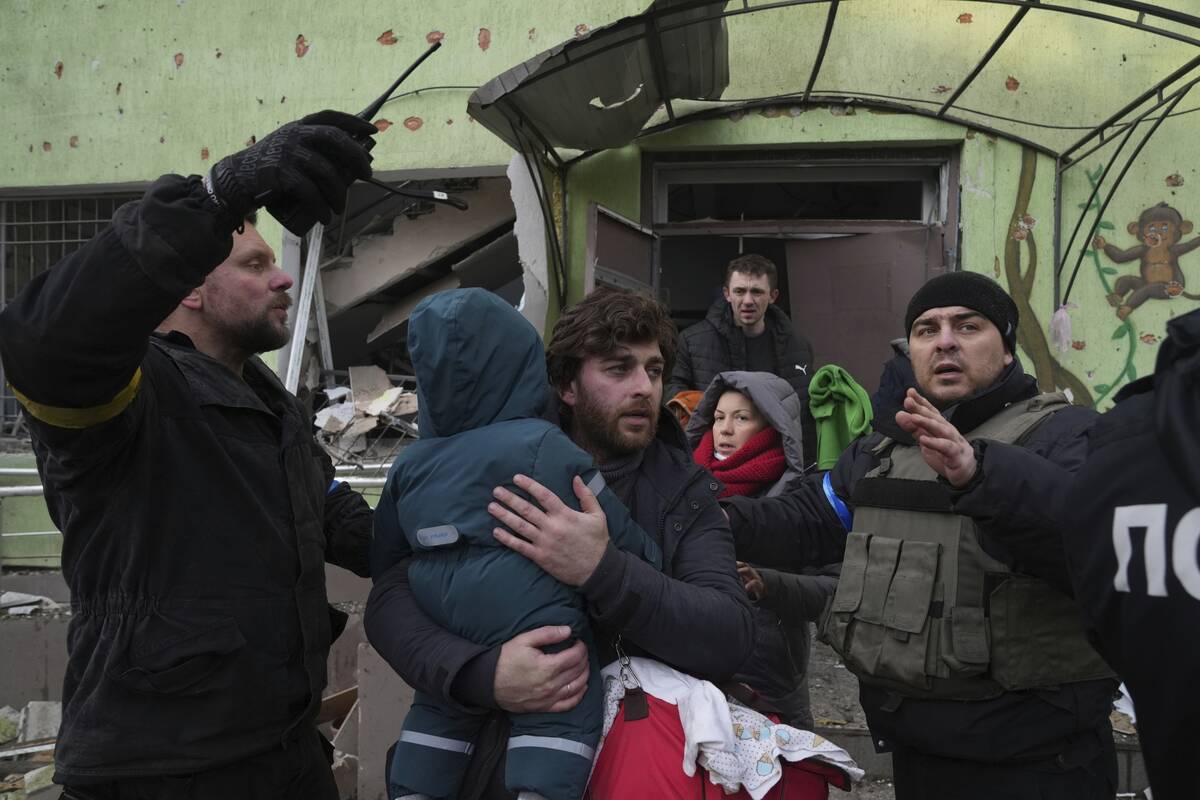Turkey hopeful as Ukraine, Russian foreign ministers meet
ANTALYA, Turkey — Turkish Foreign Minister Mevlut Cavusoglu says that a meeting between the Russian and Ukrainian foreign ministers in Turkey on Thursday aims pave the way for a meeting between the leaders of the two countries.
Russia’s Sergey Lavrov and Dmotry Kuleba of Ukraine are scheduled to hold talks on the sidelines of a diplomacy forum near the Turkish Mediterranean city of Antalya. It would be the first high-level meeting between Moscow and Kyiv since the start of Russia’s invasion of Ukraine. Cavusoglu said he would also participate in the meeting.
“Our main goal is to bring the three leaders together,” Turkey’s Hurriyet newspaper quoted Cavusoglu as saying, in reference to Turkish President Recep Tayyip Erdogan, Russian President Vladimir Putin and Ukrainian President Volodymyr Zelenskyy.
NATO-member Turkey, which has cultivated close ties with both Russia and Ukraine, is trying to balance relations with both nations. It has positioned itself as a neutral party, seeking to facilitate negotiations between the warring sides.
House OKs ban on Russian oil
The U.S. House overwhelmingly approved legislation that would ban Russian oil imports to the United States, an effort to put into law the restrictions announced by President Joe Biden in response to the escalating war in Ukraine.
Going further than Biden’s import ban on Russian oil, the bill making its way through Congress would also encourage a review of Russia’s status in the World Trade Organization and signal U.S. support for sanctions on Russian officials over human rights violations, as the U.S. works to economically isolate the regime.
Lawmakers in both parties have been eager to act, willing to risk higher gas prices at home in order to support Ukraine with a show of U.S. bipartisanship. The legislation was approved Wednesday, 414-17, and now goes to the Senate.
Rep. Lloyd Doggett, D-Texas, who helped draft the bill, acknowledged it may cost more to fill up tanks at home to stop Russian President Vladimir Putin’s tanks abroad.
Sony, Hitachi join Russia ban
Japanese electronics and entertainment giant Sony is suspending all shipments of its PlayStation video game consoles as well as game software to Russia because of the war in Ukraine.
Launch of “Gran Turismo 7,” a popular racing car game, is being suspended, and the PlayStation store in Russia will close, Sony Interactive Entertainment said in a statement Thursday.
The company “joins the global community in calling for peace in Ukraine,” it said.
Sony, which has movies and music businesses, earlier said it’s halted theatrical releases of its movies in Russia. Sony Group Corp. has also announced $2 million in humanitarian aid to the U.N. High Commissioner for Refugees and the international aid group Save the Children to help war victims.
The Hitachi Group said it is suspending exports to Russia and has temporarily stopped manufacturing there.
Hitachi said Thursday products and services related to electric power equipment “indispensable to the daily lives of people” will continue. Operations in Ukraine have resumed by moving employees and families to safer areas, it said.
US fears use of chemical weapons
The Biden administration publicly warned Wednesday that Russia might seek to use chemical or biological weapons in Ukraine as the White House rejected Russian claims of illegal chemical weapons development in the country it has invaded.
This week, Russian Foreign Ministry spokeswoman Maria Zakharova — without evidence — accused Ukraine of running chemical and biological weapons labs with U.S. support. White House press secretary Jen Psaki called Russia’s claim “preposterous” and said it could be part of an attempt by Russia to lay the groundwork for its own use of such weapons of mass destruction against Ukraine.
“This is all an obvious ploy by Russia to try to justify its further premeditated, unprovoked, and unjustified attack on Ukraine,” Psaki tweeted Wednesday. “Now that Russia has made these false claims, and China has seemingly endorsed this propaganda, we should all be on the lookout for Russia to possibly use chemical or biological weapons in Ukraine, or to create a false flag operation using them.”
The U.S. for months has warned about Russian “false flag” operations to create a pretext for the invasion. Wednesday’s warning suggested Russia might seek to create a pretense for further escalating the two-week old conflict that has seen the Russian offensive slowed by stronger-than-expected Ukrainian defenders, but not stopped.
Dmitry Chumakov, a Russian deputy U.N. ambassador, repeated the accusation Wednesday, urging Western media to cover “the news about secret biological laboratories in Ukraine.”
Pentagon press secretary John Kirby on Wednesday called the Russian claim “a bunch of malarkey.”
The international community for years has assessed that Russia has used chemical weapons before in carrying out assassination attempts against Putin enemies like Alexey Navalny and former spy Sergei Skripal. Russia also supports the Assad government in Syria, which has used chemical weapons against its people in a decade-long civil war.
Asked by a Russian journalist about the claims, United Nations spokesman Stephane Dujarric said. “At this point have no information to confirm these reports or these allegations about these kinds of labs.”
“Our colleagues at the World Health Organization, who have been working with the Ukrainian Governments, said they are unaware of any activity on the part of the Ukrainian Government which is inconsistent with its international treaty obligations, including on chemical weapons or biological weapons,” Dujarric added.
Russia has a long history of spreading disinformation about U.S. biological weapons research. In the 1980s, Russian intelligence spread the conspiracy theory that the U.S. created HIV in a lab. More recently, Russian state media have spread theories about dangerous research at labs in Ukraine and Georgia.
The conspiracy theory about U.S.-run labs in Ukraine has been picked up by Chinese state-controlled media and is now circulating in online message boards popular with COVID-19 conspiracy theorists and far-right groups in the U.S.
Filippa Lentzos, a senior lecturer in science and international security at King’s College London, said there are no “U.S. labs” in Ukraine. Instead, she said in an email, there are labs in the country that have received money through a U.S. Defense Department threat reduction program.
“These are public and animal health facilities that are owned and operated by Ukraine,” she said.
$13.6B for Ukraine aid advances
The House moved Wednesday toward approving a massive spending bill anchored by $13.6 billion for battered Ukraine and its European allies after top Democrats abruptly dropped their plan to also include fresh funds to battle COVID-19.
The House was sure to approve the Ukraine aid and the $1.5 trillion government-wide legislation containing it, which leaders were trying to push to passage Wednesday night. Senate approval, also assured, would be next, by week’s end or perhaps longer.
House Speaker Nancy Pelosi, D-Calif., said it was “heartbreaking” to abandon the $15.6 billion for combating the pandemic, a top priority for President Joe Biden and party leaders. The money was mostly to bolster U.S. supplies of vaccines, treatments and tests and battle the disease around the world, but a Democratic revolt over Republican-demanded state aid cuts to cover the new initiatives’ costs forced her to abandon that spending.
“We’ve got a war going on in Ukraine,” Pelosi told reporters, explaining the urgency Democrats felt in making concessions in bargaining with Republicans. “We have important work that we’re doing here.” She said with her party in the 50-50 Senate needing at least 10 GOP votes to pass legislation, Democrats “are going to have to know there has to be compromise.”
The Ukraine aid included $6.5 billion for the U.S. costs of sending troops and weapons to Eastern Europe and equipping allied forces there in response to Russian President Vladimir Putin’s invasion and repeated, bellicose threats. There was another $6.8 billion to care for refugees and provide economic aid to allies, and more to help federal agencies enforce economic sanctions against Russia and protect against cyber threats at home.
Biden had requested $10 billion to respond to Russia’s invasion.
17 wounded in attack on hospital
A Russian airstrike devastated a maternity hospital Wednesday in the besieged port city of Mariupol and wounded at least 17 people, Ukrainian officials said, amid growing warnings from the West that Moscow’s invasion is about to take a more brutal and indiscriminate turn.
The ground shook more than a mile away when the Mariupol complex was hit by a series of blasts that blew out windows and ripped away much of the front of one building. Police and soldiers rushed to scene to evacuate victims, carrying out a heavily pregnant and bleeding woman on a stretcher.
Another woman wailed as she clutched her child. In the courtyard, mangled cars burned, and a blast crater extended at least two stories deep.
“Today Russia committed a huge crime,” said Volodymir Nikulin, a top regional police official, standing in the wreckage. “It is a war crime without any justification.”
President Volodymyr Zelenskyy wrote on Twitter that there were “people, children under the wreckage” and called the strike an “atrocity.” Video shared by Zelenskyy showed cheerfully painted hallways strewn with twisted metal.
“There are few things more depraved than targeting the vulnerable and defenseless,” British Prime Minister Boris Johnson tweeted, adding that Russian President Vladimir Putin will be held “to account for his terrible crimes.”
Cease-fires announced
Authorities, meanwhile, announced new cease-fires Wednesday morning to allow thousands of civilians to escape from bombarded towns around Kyiv as well as the cities of Mariupol, Enerhodar and Volnovakha in the south, Izyum in the east and Sumy in the northeast.
It was not immediately clear whether anyone was able to leave other cities, but people streamed out of Kyiv’s suburbs, many headed for the city center, as explosions were heard in the capital and air raid sirens sounded repeatedly.
From there, the evacuees planned to board trains bound for western Ukrainian regions not under attack.
Civilians leaving the Kyiv suburb of Irpin were forced to make their way across the slippery wooden planks of a makeshift bridge, because the Ukrainians blew up the concrete span to Kyiv days ago to slow the Russian advance.
With sporadic gunfire echoing behind them, firefighters dragged an elderly man to safety in a wheelbarrow, a child gripped the hand of a helping soldier, and a woman inched her way along cradling a fluffy cat inside her winter coat. They trudged past a crashed van with the words “Our Ukraine” written in the dust coating its windows.
“We have a short window of time at the moment,” said Yevhen Nyshchuk, a member of Ukraine’s territorial defense forces. “Even if there is a cease-fire right now, there is a high risk of shells falling at any moment.”
Previous attempts to establish safe evacuation corridors over the past few days largely failed because of what the Ukrainians said were Russian attacks. But Putin, in a telephone call with Germany’s chancellor, accused militant Ukrainian nationalists of hampering the evacuations.
Mass grave dug in Mariupol
In Mariupol, local authorities hurried to bury the dead from the past two weeks of fighting in a mass grave. City workers dug a trench some 25 meters (yards) long at one of the city’s old cemeteries and made the sign of the cross as they pushed bodies wrapped in carpets or bags over the edge.
The strategic city of 430,000 people on the Sea of Azov has been encircled by Russian forces for the past week.
Nationwide, thousands are thought to have been killed, both civilians and soldiers, since Putin’s forces invaded. The U.N. estimates more than 2 million people have fled the country, the biggest exodus of refugees in Europe since the end of World War II.
The fighting knocked out power to the decommissioned Chernobyl nuclear plant, raising fears about the spent radioactive fuel that is stored at the site and must be kept cool. But the U.N. nuclear watchdog agency said it saw “no critical impact on safety” from the loss of power.
Attack likely to get worse
The crisis is likely to get worse as Moscow’s forces step up their bombardment of cities in response to what appear to be stronger Ukrainian resistance and heavier Russian losses than anticipated.
Echoing remarks from the director of the CIA a day earlier, British Defense Secretary Ben Wallace said Russia’s assault will get “more brutal and more indiscriminate” as Putin tries to regain momentum.
Britain’s Defense Ministry said fighting continued northwest of Kyiv. The cities of Kharkiv, Chernihiv, Sumy and Mariupol were being heavily shelled and remained encircled by Russian forces.
Russian forces are placing military equipment on farms and amid residential buildings in the northern city of Chernihiv, Ukraine’s military said. In the south, Russians in civilian clothes are advancing on the city of Mykolaiv, a Black Sea shipbuilding center of a half-million people, it said.
The Ukrainian military, meanwhile, is building up defenses in cities in the north, south and east, and forces around Kyiv are “holding the line” against the Russian offensive, authorities said.
In Irpin, a town of 60,000, police officers and soldiers helped elderly residents from their homes. One man was hoisted out of a damaged structure on a makeshift stretcher, while another was pushed toward Kyiv in a shopping cart. Fleeing residents said they had been without power and water for the past four days.
Kyiv situation worsens
Regional administration head Oleksiy Kuleba said the crisis for civilians is deepening in and around Kyiv, with the situation particularly dire in the suburbs.
“Russia is artificially creating a humanitarian crisis in the Kyiv region, frustrating the evacuation of people and continuing shelling and bombing small communities,” he said.
The situation is even worse in Mariupol, where efforts to evacuate residents and deliver badly needed food, water and medicine failed Tuesday because of what the Ukrainians said were continued Russian attacks.
The city took advantage of a lull in the shelling Wednesday to hurriedly bury 70 people. Some were soldiers, but most were civilians.
The work was conducted efficiently and without ceremony. No mourners were present, no families to say their goodbyes.
One woman stood at the gates of the cemetery to ask whether her mother was among those being buried. She was.

























